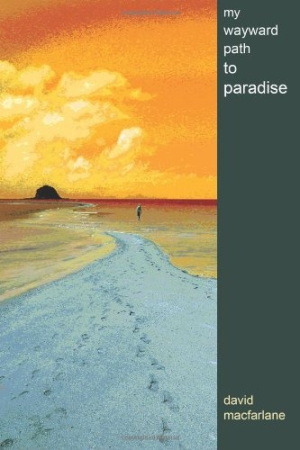It looks like you've stumbled upon a page meant to be read by our code instead of viewed directly. You're probably looking for this page.

My Wayward Path to Paradise
The intensity of the narrative dies when Myrtle the kangaroo dies, but David Macfarlane resolutely soldiers on down his “wayward path to paradise” to the bittersweet conclusion in My Wayward Path to Paradise. This attitude sustained the author through his various adventures and inspired his memoir.
Macfarlane’s narrative unfolds mostly in his home of Australia, but every time he gets a few dollars ahead, he quits whatever is engaging his attention and takes off for a new escapade. In the beginning of the story, Macfarlane, tired of school, hires on as a roustabout for a carnival. Later, he travels extensively in Europe and North America as well as Australia. He also spends a short time as a volunteer on an economic development project in Fiji. Throughout his journeys, Macfarlane continues to refine his definition of paradise and his search for that state of bliss. “Perhaps paradise is always right here, right now—and depends only on what you’re thinking, your attitude,” he writes. “But somewhere, deep in my psyche, I can’t help but wonder how long this feeling of contentment will last.”
Each chapter in the book is headed with a quote from sources as diverse as Confucius, Lord Byron, Winston Churchill, and the American writer Neale Donald Walsch. The quotations range from the banal to the intriguing, depending on the reader’s perspective. Chapter fifteen begins with a statement attributed to Confucius: “Men of principle are sure to be bold, but those who are bold may not always be men of principle.”
The author’s use of language is, by itself, an enjoyable aspect of the book. At one point he refers to “a gruff Blacktown policeman with all the compassion of an angry bush pig.” His description of driving through the outback of northern New South Wales includes this memorable line: “Every few hundred metres the acrid stench of a rotting kangaroo carcass leaps through the car window like an angry dog.”
Macfarlane devotes the last third of My Wayward Path to Paradise to recounting his development of a successful ecotourist resort on a remote island in the Whitsunday Islands, adjacent to the Great Barrier Reef. But his adventurous nature is not so easily dismissed. Contemplating the potential sale of the resort, in a rare moment of introspection, he observes, “I’ve never been one for taking the easy road. I’ve leapt into the unknown many times before, and perhaps, once again, it’s time for a new challenge.”
David Macfarlane is an able storyteller. My Wayward Path to Paradise is both entertaining and instructive, offering an inside view of the life of a successful and engaging adventurer and businessman. Macfarlane keeps the reader at arm’s length, though, and would have penned an even better book had he been more emotionally candid with his readers.
Reviewed by
John Michael Senger
Disclosure: This article is not an endorsement, but a review. The publisher of this book provided free copies of the book and paid a small fee to have their book reviewed by a professional reviewer. Foreword Reviews and Clarion Reviews make no guarantee that the publisher will receive a positive review. Foreword Magazine, Inc. is disclosing this in accordance with the Federal Trade Commission’s 16 CFR, Part 255.